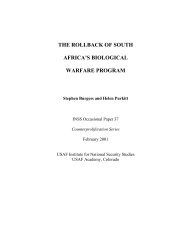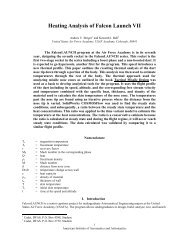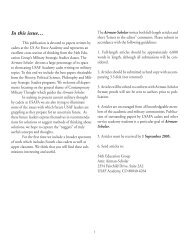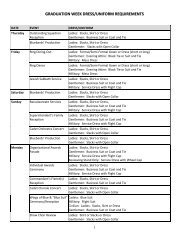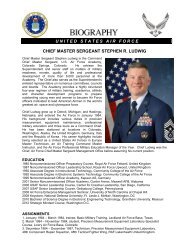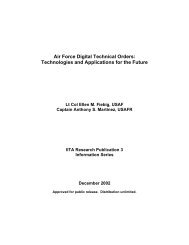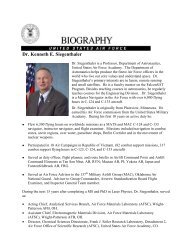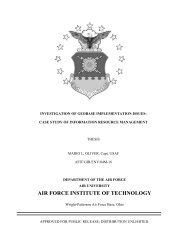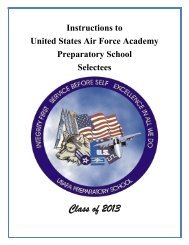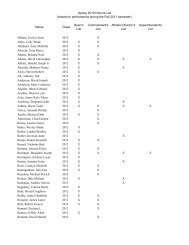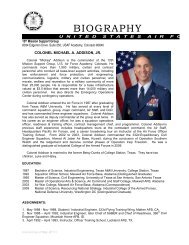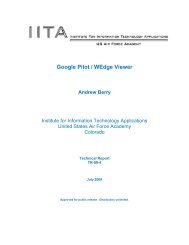Military Professionalism - United States Air Force Academy
Military Professionalism - United States Air Force Academy
Military Professionalism - United States Air Force Academy
Create successful ePaper yourself
Turn your PDF publications into a flip-book with our unique Google optimized e-Paper software.
Fromm, Peter. “Warriors, the Army Ethos, and the Sacred Trust of Soldiers.” In<br />
“Ethics Reader – Special Edition 2010.” <strong>Military</strong> Review (Sept. 2010): 19-26.<br />
http://usacac.army.mil/CAC2/<strong>Military</strong>Review/Archives/English/<strong>Military</strong>Review_201009<br />
30ER_art006.pdf<br />
The Army should reevaluate whether it can afford to continue calling its Soldiers<br />
warriors. The dissonance implied by “warriors” can produce conflicting psychologies.<br />
History and literature have attached a stigma to the word “warrior.” The idea of creating<br />
“information warriors” is self-defeating. The Army is full of great Soldiers, not literal<br />
warriors, and their mission is to protect, not destroy.<br />
Gibbons, Thomas J. “Honor Codes and <strong>Military</strong> Core Values.” In Attitudes Aren’t<br />
Free: Thinking Deeply about Diversity in the U.S. Armed <strong>Force</strong>s. Ed. James E.<br />
Parco and David A. Levy. Maxwell <strong>Air</strong> <strong>Force</strong> Base, Alabama: <strong>Air</strong> University<br />
Press, Feb. 2010, 481-487.<br />
http://handle.dtic.mil/100.2/ADA518901<br />
Gibbons recommends that the military community should continue to reinforce honor<br />
codes in military schools and service academies. Also, the military community should<br />
continue to emphasize military core values in military schools and in the military<br />
workplace. Finally, formal ethical training should be a part of the curriculum in war<br />
colleges and senior enlisted schools.<br />
Gurney, David H. “An Interview with Michael G. Mullen” Joint <strong>Force</strong> Quarterly 54<br />
(3 rd quarter 2009), 7-11.<br />
https://digitalndulibrary.ndu.edu/u?/ndupress,21107<br />
Civil-military relations are vital to the nation writ large. The military must remain<br />
apolitical, and professional advice should be given privately to civilian leaders. <strong>Military</strong><br />
accountability must be maintained.<br />
Hurley, David. General Sir John Hackett Memorial Lecture. The Great Hall, Kings<br />
College, London, Nov. 11, 2010.<br />
<strong>Military</strong> forces face increasing challenges in an increasingly complex world. The<br />
potential for state on state hostilities has diminished but not disappeared, while the<br />
spectrum of conflict has extended to encompass many other actors with a bewildering<br />
range of aims, motives and means. These challenges require that the education and<br />
development of military leaders evolves to match them. To the fundamental skills of<br />
battle management and combat must be added cultural awareness and historical<br />
knowledge, as well as a firm foundation of ethical understanding. Leaders must be able<br />
to lead, but they must also be ready to liaise, persuade and cooperate, however alien the<br />
protagonist or strange the environment. This alone will require personal skills and self<br />
12




